#Adrien Brody new movie
Explore tagged Tumblr posts
Text
youtube
Dive deep into the world of "The Brutalist" and discover the fascinating blend of fact and fiction behind Adrien Brody’s latest film. We unravel the real inspirations and fictional elements that make this movie a must-watch. Don’t miss our detailed breakdown!
#The Brutalist movie#Adrien Brody#The Brutalist fact check#Brutalist architecture#Adrien Brody new movie#The Brutalist true story#Brady Corbet#Mona Fastvold#Guy Pearce#Felicity Jones#Golden Globes#historical fiction films#architecture movies#film analysis#The Brutalist explained#Golden Globes winner#architecture in movies#Youtube
2 notes
·
View notes
Photo








Fantastic Mr. Fox (2009), dir. Wes Anderson
Excuse me everyone, I'm going to go meditate for half an hour
#movies#film#text#words#movie#new#textinfilms#stop motion#fantastic mr fox#wes anderson#george clooney#meryl streep#bill murray#owen wilson#willem dafoe#jason schwartzman#helen mccrory#adrien brody
3 notes
·
View notes
Text
On June 28, 1999, Summer of Sam premiered in New York City.

#summer of sam#adrien brody#spike lee#horror movies#horror film#horror thriller#period drama#slasher movies#punk movies#movie art#art#drawing#movie history#movie premiere#new york city
4 notes
·
View notes
Text
Sick at home so I made the choice to watch all films with Adrien Brody I can get my hands on.
Watched Manhattan Night last night and really enjoyed it. Not the kind of movie I normally watch but it was very good! Not sure which one I'll watch next. 😬
#adrien brody#glad i have some new movies to watch. after I watched almost everything with Cil and Jamie... Adrien is a welcome change.
4 notes
·
View notes
Text
trying to sit through maid in manhattan and i have to say the version of this movie i imagined in the blockbuster romcom section in 2008 before ultimately picking the other boleyn girl (which changed my life in arguably a bad way) was a lot better than this
#for one thing i sat here and made this post while eating ice cream instead of watching this movie so#i think my major problem with it is that ralph fiennes is the love interest and not somebody FROM new york like. i know the thick new york#accent is not a hollywood heartthrob accent but it is TO ME. when i was in the closet in queens i was way too weird and squirrelly to get#hit on but if one of those guys from long island had offered i definitely would’ve fucked them for the accent. in fact i HAD terrible sex#with someone for the accent now that i think about it. she was a pizza chef and did not reciprocate which sucked. but g-d was she hot#like if ADRIEN BRODY was the love interest now THAT would be a movie for me. i had a bi panic so intense when i saw him in poker face i#STILL haven’t gotten over it. but RALPH FIENNES??? with his BARELY BARELY BARELY grown out haircut from RED DRAGON????
4 notes
·
View notes
Text

The AI Controversy Surrounding The Brutalist and Adrien Brody’s Performance
If you haven’t already heard about The Brutalist, it’s the epic period drama that’s been making waves this awards season. Directed by Brady Corbet and starring Adrien Brody and Felicity Jones, the film follows Hungarian-born Jewish architect László Tóth (Brody) and his wife Erzsébet (Jones) as they build a new life in the US. With its gripping narrative and striking visuals, it’s earned critical acclaim—including three Golden Globe wins. But behind the glowing reviews lies a controversy that’s sparked heated debates online.
The issue? The use of AI to adjust the Hungarian accents in Brody and Jones’ performances.
What Happened?
The buzz started when editor Dávid Jancsó revealed that AI technology from Ukrainian startup Respeecher was used to refine Hungarian language dialogue. While this might sound like a straightforward post-production tool, some speculated that the AI had been used to alter or enhance the stars’ performances, sparking backlash from audiences concerned about authenticity and the ethics of AI in filmmaking.
Brady Corbet, however, was quick to set the record straight. Speaking to The Hollywood Reporter, he emphasized that the performances remained entirely the actors’ own, stating, “Adrien and Felicity’s performances are completely their own. They worked for months with dialect coach Tanera Marshall to perfect their accents.”
The AI, according to Corbet, was only employed to tweak specific vowels and letters in Hungarian dialogue. “The aim was to preserve the authenticity of Adrien and Felicity’s performances in another language, not to replace or alter them and done with the utmost respect for the craft.”
A Closer Look at the Technology
Dávid Jancsó, a native Hungarian speaker, shared further insight into the process. Hungarian is notoriously difficult to pronounce for English speakers, and the actors faced a significant challenge in mastering the language. “If you’re coming from the Anglo-Saxon world certain sounds can be particularly hard to grasp,” Jancsó explained. With a limited budget of under $10 million, Respeecher was brought in to help refine the accents efficiently without compromising the actors’ hard work.
Jancsó made it clear that the AI wasn’t a shortcut. Brody and Jones recorded their own voices for the process, and the adjustments were minimal—primarily involving replacing letters to ensure accuracy. While these changes could technically have been made manually, the sheer amount of Hungarian dialogue made the AI tool a necessity to avoid delays in post-production.
The Bigger Picture: Art, Technology, and Ethics
This controversy raises important questions about the role of AI in filmmaking. While tools like Respeecher can save time and enhance authenticity, they also prompt concerns about where to draw the line. When does AI become a crutch? Can its use diminish the craft of acting? Corbet’s response underscores the balance he aimed to strike: using technology to support, not overshadow, the human element of performance.
Why The Brutalist Matters
Beyond the controversy, The Brutalist has been praised as one of the year’s unmissable films. With its unflinching look at immigration, identity, and ambition, the film is both timely and timeless. Critics have called it a masterpiece, with NME’s Paul Bradshaw describing it as “deliberately never an easy watch” but emotionally devastating in the best way.
As the movie hits UK theaters this Friday, the conversation surrounding it continues to evolve. Whether you’re drawn in by the controversy, the performances, or the story itself, one thing’s for sure: The Brutalist is a film that demands to be seen—and discussed.
What are your thoughts on the use of AI in filmmaking? Let’s talk about it in the comments!
#the brutalist#adrien brody#felicity jones#brady corbet#AI in filmmaking#film controversy#movie news#period drama#golden globes#hungarian cinema#Respeecher#ethics in technology#immigration stories#film criticism#cinema debate#movie spotlight
0 notes
Text

#memes#my diary#q#niche#cool girl#blogging#blog#girl blogger#nyc#new york city#criterion collection#movies#lana del rey#adrien brody#niche memes#moodboard#esoteric#aesthetic
0 notes
Text
Adrien Brody takes home the Golden Globe for his soul-stirring role in 'The Brutalist'!
Adrien Brody takes home the Golden Globe for his soul-stirring role in 'The Brutalist'! Dive into the story of resilience, art, and a historic win.
Read the full article right here: https://www.theomenmedia.com/post/adrien-brody-s-emotional-triumph-winning-the-golden-globe-for-the-brutalist-full-story-inside

0 notes
Text
Sources: Heat's Jimmy Butler prefers trade out of Miami

Six-time NBA All-Star Jimmy Butler prefers a trade out of Miami ahead of the Feb. 6 deadline, league sources told ESPN>>>Read More
#“Keyword”#“pat riley”#“pat riley net worth”#“pat riley young”#“pat riley age”#“pat riley rings”#“pat riley italian”#“pat riley lakers”#“pat riley family”#“pat riley 1980”#“pat riley stats”#“pat riley jimmy butler”#“pat riley suits”#“pat riley news”#“pat riley book”#“pat riley kentucky”#“pat riley movie”#“how old is pat riley”#“how many rings does pat riley have”#“adrien brody pat riley”#“patricia riley”#“patrick riley”#“patterson riley”#“pathfinder riley”
0 notes
Text
Adrien Brody Reveals Lasting Effects of Drastic Weight Loss and PTSD from Oscar-Winning Role in "The Pianist"
Adrien Brody discusses the struggles he faced, including PTSD and an eating disorder, after preparing for his role in The Pianist
Adrien Brody and ‘The Pianist’. (PHOTO: VIA DEADLINE, Jon Kopaloff / Getty Images / Focus Features / Courtesy Everett Collection) Adrien Brody, the actor who won an Oscar for his role in the 2002 movie The Pianist, has shared how difficult it was to prepare for and recover from the part. In the movie, Brody played Władysław Szpilman, a musician who survived the Holocaust during World War II. To…
0 notes
Text
The Cast of ‘Asteroid City’ Discusses the Film’s Themes
NOC Interviews: The Cast of ‘Asteroid City’ Discusses the Film’s Themes @mayahawke @rupertfriend @adrienbrody @jfreewright #AsteroidCity @AsteroidCity @FocusFeatures
Before Asteroid City hits theaters everywhere, I had the chance to interview Scarlett Johansson, Jason Schwartzman, Maya Hawke, Rupert Friend, Adrien Brody, and Jeffrey Wright in person! The film is currently in select NY and LA theaters. Continue reading Untitled

View On WordPress
#actors#Adrien Brody#Asteroid City#cast interviews#exclusive interviews#Films#in theaters#Interview#Jason Schwartzman#Jeffrey Wright#Maya Hawke#Movies#new movie#Rupert Friend#Scarlett Johansson#YouTube
0 notes
Text
The Actors Roundtable: The fear factor behind great art
By Elena Nelson Howe
Photography by Christina House
Once an actor finds his name popping up in Oscar conversations, he’s pretty much arrived in the industry, right? Actually, no, not necessarily, says Jeremy Strong, who plays unscrupulous lawyer and Donald Trump mentor Roy Cohn to much acclaim in “The Apprentice.”
“There’s a thing called ‘arrival fallacy,’ which is that the horizon is just always receding. You don’t arrive. I mean, I’ve never felt like I’ve arrived. It’s just a search, and you’re on the frontier of uncertainty and doubt, and taking risks.”
“And then the bottom falls out, and you keep looking,” adds Adrien Brody, who plays the Holocaust survivor and visionary architect at the heart of Brady Corbet’s “The Brutalist.”
“That frontier just keeps moving,” Strong agrees.
Even now, with this season’s breakout performances and glowing reviews, a conversation among several actors shows they share the same fears and doubts as the rest of us.
Tune in to Spectrum News 1, where this conversation will air on Dec. 13 at 8 p.m. and will repeat throughout the month.
“I don’t think I ever looked at the next job and went, ‘All right, it’s coming and here we go.’ I think it’s always just the terror of, ‘OK, I got the job. Am I going to ruin it?’ The fear of, ‘I’m wrong for it,’” says Kieran Culkin, who stars in the affecting “A Real Pain” with the film’s writer-director, Jesse Eisenberg.
These three actors — along with Peter Sarsgaard, who stars in “September 5,” about the terrorist attack at the 1972 Munich Olympics; Colman Domingo, who plays an incarcerated man who discovers the transformative power of art in “Sing Sing”; and Sebastian Stan, who not only plays the future president in “The Apprentice” with Strong but also stars in “A Different Man,” a cautionary story of inner discovery — got together last month for The Envelope Actors Roundtable moderated by Spectrum News 1 host Kelvin Washington. They shared their thoughts on auditioning, responding to fear and the hard truths of the world around us.
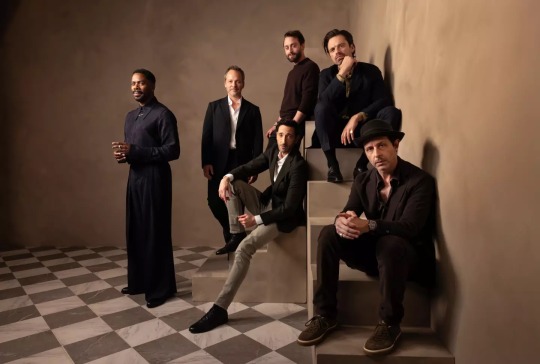
Actors Colman Domingo, from left, Peter Sarsgaard, Adrien Brody, seated, Kieran Culkin, Sebastian Stan, Jeremy Strong.
These excerpts from that conversation have been edited for length and clarity.
It’s a journey. It’s a process. So how do you approach auditions?
Sebastian Stan: The best advice I ever got was from Israel Hicks, who was the theater head at Rutgers, where I went to school. And he always said, “You’ve got to just bring the day with you to the audition.” Whatever’s happening up to walking in that door just ... like maybe you spilled coffee on you, or you got a bad phone call, or whatever. You just bring in the truth of that day.
Peter Sarsgaard: But for me, every day that I had an audition that I cared about was a day of high anxiety. And so I only did well in the auditions where it was extremely high stakes. I couldn’t deny what I was feeling. I would’ve looked like a psychopath. I had to let it out. And so the jobs ... I remember doing auditions sometimes where I would be bizarrely emotional in a scene that was not emotional. Because I f— wanted it.
Jeremy Strong: I had a manager once who told me, “You know, you seem desperate. That’s why you’re not getting it: You seem desperate.” And I said, “I am desperate.” This is like we’re fighting for our lives trying to do this thing.
Sarsgaard: It feels like that sometimes.
Strong: ... and you really want to work. It does feel miraculous when you get the chance to work.
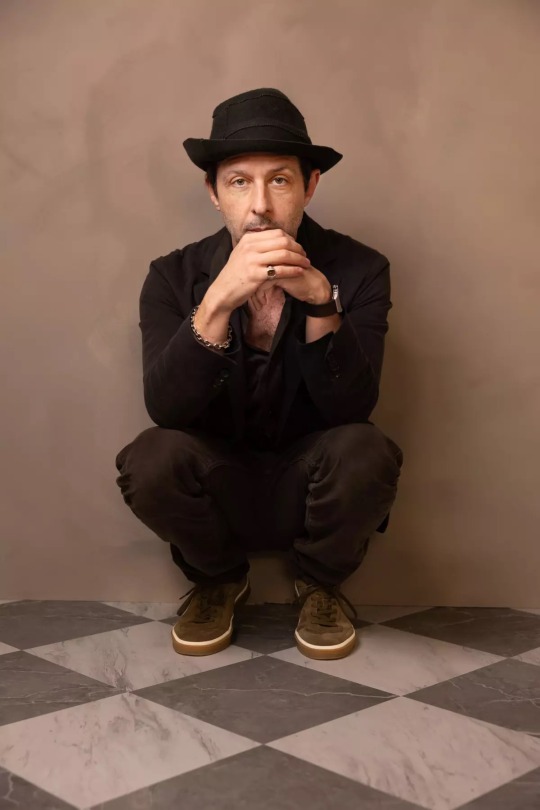
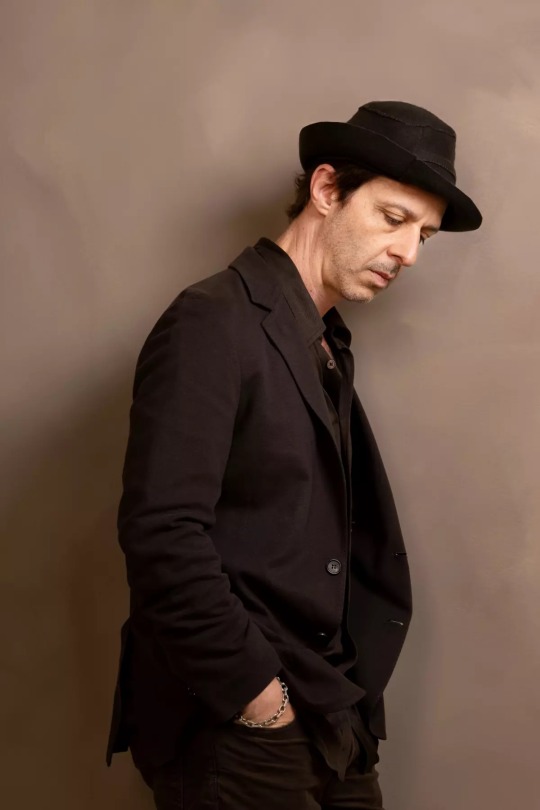
Adrien Brody: I booked a movie when I was 14, which was one of the first things I went out for. And my dad took me to the audition, and he told me, “Go in there like you already have it. You’re just showing them how you’re going to do it. Don’t go in there asking for the job.”
Kieran Culkin: I think I was told in my first audition almost the opposite, which was like —
Brody: Go and beg them.
Culkin: — It was like, “You’re going into something that’s not yours so you don’t have to feel, so [acts stressed].” You said your first audition was something you booked?
Brody: And then it was 17 years of not getting work.
I knew I had to invite in tenderness and a grace that he maintained while he was on the inside.
— Colman Domingo
From auditions to current performances, Colman, you play John “Divine G” Whitfield, a man who was wrongfully incarcerated in “Sing Sing,” and the real guy is also executive producer. What’s that experience like, trying to showcase his journey while he’s there and a part of this film?
Colman Domingo: You have to honor the spirit of the person but also liberate yourself from a portrayal of them. I feel like even when I met him, I downloaded information. I didn’t ask him anything, because I’m not that person who wants to pry into someone’s life or say, “How was it for you in the inside?,” all that stuff. We just got to know each other like we get to know anyone, you know what I mean? The most banal, simple things.
And there were two things about him: when I found out that he considered himself sort of a jailhouse lawyer and how he was always in the law library, and he was advocating for others for good food, for his own liberation eventually, but also even — when he founded this theater company there — Rehabilitation Through the Arts. And all these inmates were finding that thing that was so sorely needed in this dangerous place: a place to unpack, to be tender, to put yourself in someone else’s shoes. Grown men going to places that they may have never been allowed to experience or be, especially Black and brown men in particular. I knew I had to invite in tenderness and a grace that he maintained while he was on the inside.
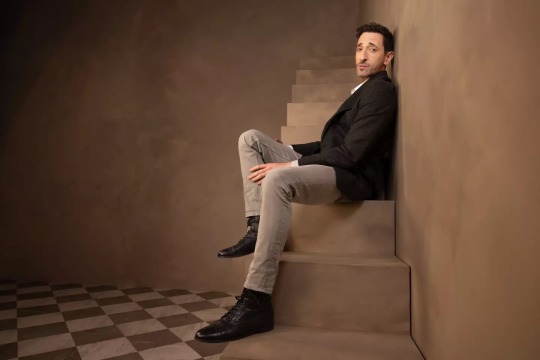
“I can see how past suffering informs insight and informs a kind of creative fervor and the need to leave something indelible behind,” Adrien Brody says of “The Brutalist” and his own family history.
Kieran, you were working with Jesse Eisenberg, who’s also the screenwriter and director. Which version was easier to work with, Jesse the actor or Jesse the director?
Culkin: He was great at all of those things. I mean, going into it, he wrote a beautiful script. And I knew him to be a great actor. I didn’t know what he was going to be like as a director. But that was the first time I’ve worked with an actor that also directed. Have you guys done that yet? It’s tough. That is like, Day 1, him doing a scene with you as your partner, and then they go, “Cut,” and then go, “Here’s how you can do it better.” And I’m sitting here going like, “Oh, you’re going to judge me? Because I got f— notes for you too. I know how you can do it better too.” And then the defenses go up and all that. But he was fantastic. And it was only his second film [as writer-director].
“I felt like I understood him right away and understood this dynamic right away,” Kieran Culkin says of his “A Real Pain” character’s relationship to his cousin, played by Jesse Eisenberg. (Searchlight Pictures)
I think we can all relate to your character, Benji. It’s almost one of those, “I love him because he’s crazy. But he also drives me crazy because he’s crazy.” What part of that resonated with you?
Culkin: When I read it, I found the guy to be really surprising and really just ... I felt like I understood him right away and understood this dynamic right away. But then 20 pages in, he would say something completely surprising. And I went, “Oh, this guy, almost in spite of you, if you asked him a question, he’s going to give you something you’re not going to expect.”
And I loved it. So I just went, “I’m not going to prepare at all.” I didn’t read it again for a year. And then right before we did it, I read it once. I would not want to know what the scene we were doing was until I was walking to set that day, which would give Jesse a lot of anxiety. I’d be like, “What are we shooting today?” And he’s like, “You’re kidding. You have a whole speech.”
Brody: You should work with Ken Loach. I did a movie with him, and he would give us half the scene. And so you wouldn’t know what the end of that scene was because he was working with predominantly nonactors. And then so whoever the catalyst was in the scene got that section. And this person would fall down, and you didn’t know if that person just —
Culkin: Tripped or that was the scene? I want to do that. I want to work with that person.
Sarsgaard: I auditioned for him, and it was like, “All right, let’s just improvise.” And I’m like, “Well, give me a ... Where do I begin?” “Just do something.” And I found it incredibly difficult. For me, the reason I do it is the story. So I don’t need to know what I’m going to do in the scene, but I’m driving the story?
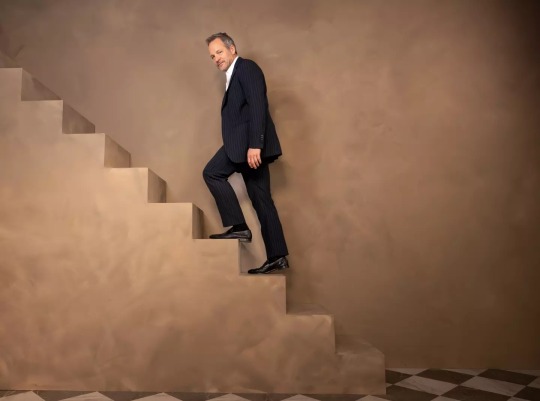
“It’s like game day. They’re just in it. They just went 22 straight hours of just doing it,” Peter Sarsgaard says of the team covering the terrorist attack at the Munich Olympics, the story of his film, “September 5.”
Strong: Peter and I had to do a thing yesterday called Fearless Performances. And we didn’t have time to say it, but I woke up this morning thinking it’s such a misnomer because there’s so much fear involved, at least for me. [To Culkin] I was thinking about a conversation we had when you were thinking about doing Jesse’s movie. You were on the precipice of it. It felt like a big risk and something you hadn’t done. And what I love about what we all get to do is attempt to do something that you don’t know that you can do. I’m working in sort of Bruce Springsteen world right now, and he said something in his autobiography, that “the experience that you have, the exhilaration of it and the depth of it is directly proportional to the void that you’re dancing over.” And so I find that that equation works.
Stan: I think all of it is fear now. For me, literally, if I’m thinking I can’t do it, [it] is maybe the biggest sign that I should be trying to do something. It’s so easy to fall into these little tricks, what’s worked before, and you just do it again. So, especially with these last two for me, it was so paralyzing at times that I was almost driven by it.
I think all of it is fear now. For me, literally, if I’m thinking I can’t do it, [it] is maybe the biggest sign that I should be trying to do something.
— Sebastian Stan
Playing Donald Trump, was that fear? He’s been the president, he’s going to be the president again. What were the challenges or your mind-set going into that?
Stan: Well, I mean, this is such a collaboration. It’s the director, it’s who are your partners. It’s this whole thing about trust and being able to go there with somebody. But then, there’s something about when you get older and you want to feel like you’re part of a meaningful work. You’re adding to a conversation, reflecting these times that we’re in no matter how uncomfortable they are.
“The movie is sort of about this relationship in a sense, a love story,” Jeremy Strong says of Roy Cohn and Donald Trump in “The Apprentice.” (Pief Weyman/Apprentice Productions)
Strong: The movie is sort of about this relationship in a sense, a love story. This sort of dark chrysalis that created the Donald Trump that we know today. What joined them together, I think, were kind of dark affinities. They were both these outsiders from the boroughs with tremendous life force and ambition with a shared, I think, lack of scruple or ethical core, for whom winning was the only moral measure.
It’s been strange to talk about this movie as a movie right now, because it’s about a very living danger, and I look at what’s happening in this country right now, and I think you can trace so much of it back to the influence of Roy Cohn and his ideology, and his nihilism, and his sort of gospel of hatred and divisiveness. That’s the political side. The creative side was really fulfilling. Roles like this are kind of a holy grail for an actor, where there’s a degree of difficulty, and you want to try to transform, and you want it also to be alive and not just mimetic and all those things.
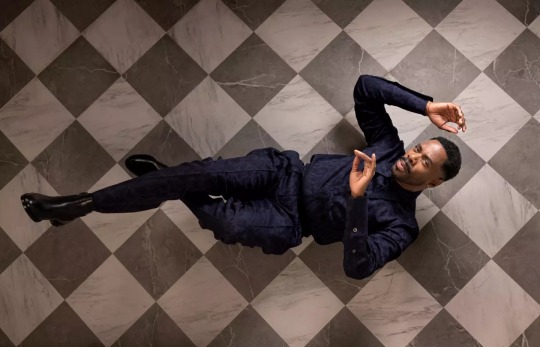
“You have to honor the spirit of the person but also liberate yourself from a portrayal of them,” Colman Domingo says of playing a real person in “Sing Sing.”
Some of these films, there is a historical gravity to them. Adrien, with “The Brutalist,” your character comes to America after the genocide but then realizes it’s difficult to succeed here. Where did you go to channel this character?
Brody: Well, my mother is a Hungarian immigrant and an artist, a New York photographer. And she’s also someone who has kind of guided me in my understanding of art and the yearning to leave behind something that is meaningful and brings more light than darkness to this world. She and her parents fled war-torn Budapest in 1956 on the back of a truck, under a bed of corn, as they were shooting flares and trying to basically shoot down people fleeing the Soviet occupation.
I witnessed how hard it was for [my grandfather], because his English-language skills were not up to par, it prevented him from getting work. And so that’s a layer of connection, a feeling of knowing the journey and very different from [character László Tóth’s] journey, but there are very many parallels. And his journey of fleeing Nazi-occupied Europe and surviving concentration camps. I can see how past suffering informs insight and informs a kind of creative fervor and the need to leave something indelible behind.
Strong: There’s an intersectionality with these films as stories with real things in our world. I feel like the world is on fire. And there’s a role for storytelling that is so essential in our world right now. And I don’t think there’s another art form that has that connective power, arguably.
Stan: And the idea that in a system like Sing Sing, there’s a level of acceptance of self that’s happening on such a deeper, more profound level than it’s actually happening in the real world. Because I feel like “The Apprentice” and “A Different Man” are so much about identity and self-truth, and the loss of self, and the denial of reality, which is a very real thing that’s happening now. I don’t know if people are interested in the truth or confronting themselves, or wanting to accept themselves. People are more interested in inventing their own version of things.
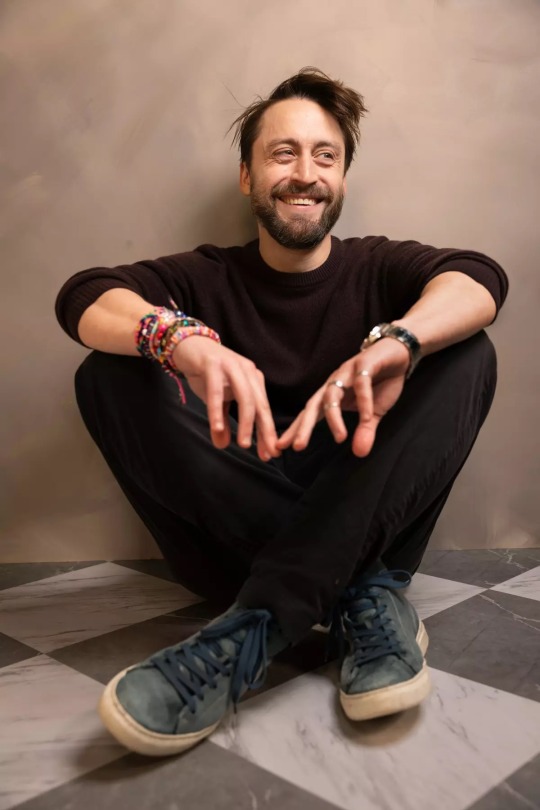
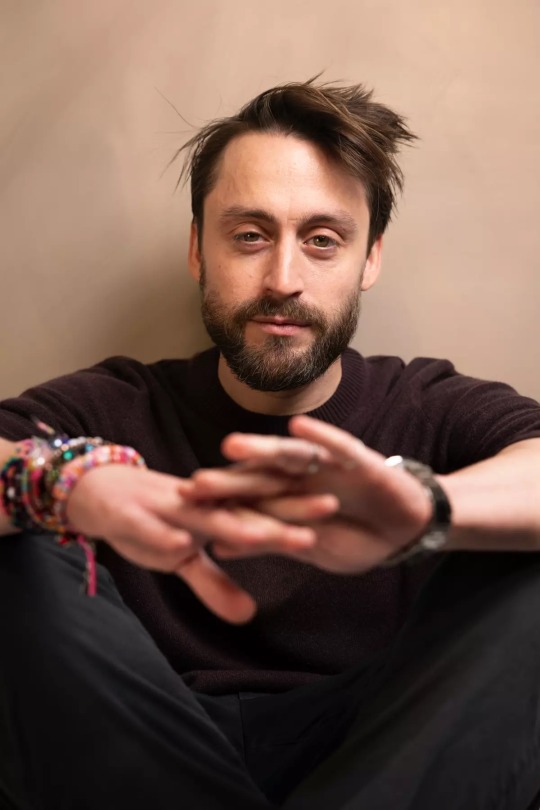
Peter, talking about the gravity of world events: “September 5” does this in such detail, what was happening there in Munich. What it’s like having to deal with something of that magnitude?
Sarsgaard: Just by talking to the guys involved, I mean, they don’t think about the fact they’re involved in something of that magnitude, because it’s like game day. They’re just in it. They just went 22 straight hours of just doing it, and doing it, and doing it. They pointed a live camera at a balcony, and 700 million people watched that image. It’s a balcony, but it is the potential for violence that is really keeping them there. For some of them, their hearts are pounding because they’re hoping for the survival of the people that are in there. And I think that’s a good many people. But we have to acknowledge this other part of humanity that’s a kind of schadenfreude where we’re lusting for some violence.
The way that at any given moment in our lives, right now, we could pick up our phone, and the most horrendous thing imaginable is going on in the world, and then we can sit and joke with each other, and eat popcorn, and go watch a comedy. I mean, I don’t really have the answer. I think one of the lovely things that my movie does is ask a lot of questions about the way that we consume media, about, “Does a camera tell the truth anymore?” This idea that these guys had new technology, which was a live camera, and the minute the hostage crisis happened, they pointed it.
Well, now why do we have to watch a live crisis situation? Is that news? Is that going to help us understand our society better? Could we learn about it tomorrow? Is it going to help the hostages get freed? Now, obviously with police brutality, stuff like that, I would say wonderful. But to get our daily news, when everyone has a camera in their pocket — first of all, there’s point of view. This frame is not the
truth. The truth is all of it, right? And there’s also AI. There’s a million different reasons why we can’t trust an image anymore.
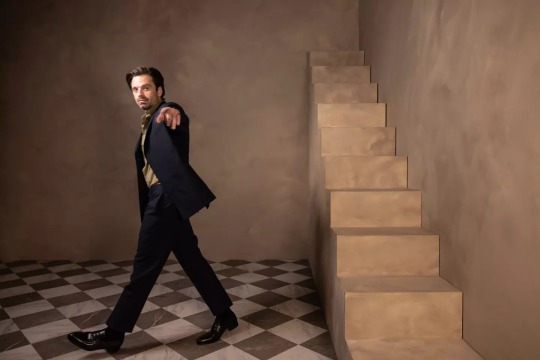
“It was a very powerless experience ... a terrifying experience. How people pretend you’re totally nonexistent,” Sebastian Stan says of walking in New York City wearing the makeup for the disfigured man he plays in “A Different Man.”
Sebastian, in “A Different Man,” there’s a self-reflection in your character, who has an opportunity to present himself differently. What did you learn about how we view ourselves versus how others view us? And talk about working with Adam Pearson, who has some of these same physical challenges in the film.
Stan: Adam Pearson, who’s a great actor from “Under the Skin,” and he’s got neurofibromatosis, which are these tumors that develop at around 3 or 4 years old. And the biggest gift I was able to receive working on that movie was his mother coming up to me and saying afterward, “I’ve always wished for someone to walk in his shoes. And you were able to do that.” And I was lucky. We had a great prosthetics artist, Mike Marino. And I was able to walk around the city in that, and no one recognized me. And it was a very powerless experience ... a terrifying experience. How people pretend you’re totally nonexistent.
Well, part of why the movie’s special, and I wanted so deeply to be involved with it, is that it talks about this curiosity that we all have. But we haven’t learned about the regular person out there. The regular person has to fight against these narratives that we’ve grown up with in terms of not knowing how to handle that moment. So two things happen: ignorance or judgment. And the filmmaker, who’s disfigured himself, really wanted to bring it out in the open. And for us to go on this journey and get more in touch with how can we approach that in a different way. But on a more relatable basis, it really is about lying to yourself. And once the lie happens, what you have to keep doing to maintain the lie and suppress the truth.
Brody: And they’re so hard to undo.
Stan: And how far we can go to not face that painful moment with ourselves. And that’s what the character endures. By the time [he sees it] it’s too late, his life’s been taken away from him.
Thanks for being here, gentlemen ...
Brody: This has been kind of special. I didn’t know what to anticipate. We’re all kind of really and thematically talking about what’s propelling each of us. And with the exception of you needing f— panic and —
Culkin: I was going to say, we’re all a little bit different.
Brody: But I love that too though. You know what it is? You’re super honest. You are honest with your work.
Culkin: Yeah, thanks.
Brody: Your comedic sensibilities.
Culkin: [To camera] You still rolling on this? Let’s get a nice sound bite.
#Sebastian Stan#Jeremy Strong#Colman Domingo#Peter Sarsgaard#Adrien Brody#Kieran Culkin#Los Angeles Times#Roundtable#Interview#The Oscars#mrs-stans
23 notes
·
View notes
Text
The famed architect Louis Kahn made little effort to live Jewishly in his life, yet throughout the 20th century he designed synagogues and famous Holocaust memorials across the country.
The Hungarian Jewish designer Marcel Breuer, educated at the Bauhaus school, was forced to renounce his Judaism while he lived in Germany. Later he wowed Americans with his striking brutalist designs — until the tides shifted, and his buildings became some of the nation’s most reviled.
Neither Kahn nor Breuer are mentioned by name in the new movie “The Brutalist,” which follows a Holocaust survivor and acclaimed architect as he attempts to complete a monumental structure in suburban Philadelphia. Yet the movie tells their story, as well as that of other prominent Jewish architects and designers of the 20th century, many of whose biographical details informed the journey of the movie’s fictional hero, László Tóth, played by Adrien Brody.
The film’s 36-year-old director, Brady Corbet, says he drew heavily from Kahn, Breuer and other Jewish designers in crafting his story. Yet he claims he didn’t set out to make a Jewish movie, just one about architecture.
“The film could take place at any time and be about someone from anywhere,” Corbet told a crowd at the Chicago International Film Festival following a screening of the film in October, when an audience member asked him specifically about the movie’s Jewish content. “Because the characters are Eastern European Jews, it was important for us to get the details right.”
Corbet, who co-wrote the screenplay with his partner Mona Fastvold, said he was fascinated by brutalism in particular — a popular, yet polarizing, mid-century architectural movement that prioritizes large, rough surfaces and raw concrete exposure.
Why brutalism? Because governments all over the world have ordered such buildings destroyed soon after taking power; the buildings were, to him, an effective metaphor for unwanted groups of people who had once gained some degree of societal prominence. In short, he said, “so many people hated it.”
But hardly anyone is hating “The Brutalist.” The film premiered at the Venice Film Festival this fall, where it won the best director prize — considered a runner-up to the prestigious Golden Lion award. Recently it also scored the best film and best actor awards from the New York and Chicago film critics groups, and racked up a stack of Golden Globe nominations. Hollywood trades expect the film to be a top Oscar contender, especially Brody, who performs much of his dialogue in Hungarian and whose accolades come two decades after the Jewish actor won an Oscar for portraying another artistic Holocaust survivor in “The Pianist.”
The accolades are notable for several reasons. The film has an epic, three-and-a-half-hour runtime, including an intermission — the kind of length that, while befitting the scope and theme of a story about an uncompromising artist, could turn theatergoers off. (The title card that appears onscreen during the intermission is a photo of László’s wedding in prewar Hungary, with a smiling, happy Jewish family posing under their synagogue door’s Hebrew lettering, presented as documentation to help bring his surviving family over to the United States.)
It also might be difficult to find a theater that’s playing it in the manner Corbet intends the film to be seen: To evoke the time period, he shot it on VistaVision, a now-dead film format known for a giant field of vision and hyper-detailed focus, and has encouraged viewers to seek out the small number of theaters equipped to show the movie on 35mm or 70mm prints.
Then there’s the subject matter itself, which, during a time of immense fear and uncertainty for Jewish Americans, unapologetically tackles the Holocaust; antisemitism; the hazards Jews faced emigrating to the United States; Jews being pushed out of elite society across the globe; and debates about the early years of Zionism. Early in the film, László learns that a Jewish cousin has tried to remake himself as a gentile; later, after a series of setbacks in America, one of his family members encourages him to move to Israel.
(The film joins a deep crop of Jewish-interest movies this awards season, including Jesse Eisenberg’s Holocaust dramedy “A Real Pain”; “September 5,” a controversial docudrama about the 1972 Munich Olympics massacre of Israeli athletes; “The Order,” a fact-based thriller about the 1984 murder of a Jewish radio host by white nationalists; and the Bob Dylan biopic “A Complete Unknown.”)
After initially agreeing to a Jewish Telegraphic Agency interview, a representative for A24, the film’s distributor, canceled planned conversations with Corbet, Fastvold and several members of the film’s production team the day before it was scheduled. A24 was unable to accommodate requests to reschedule the interviews in time.
But in Chicago promoting the film two months earlier, Corbet — a former actor whose directorial debut, “The Childhood of a Leader,” was a parable of Hitler’s early years — told the sold-out crowd what drew him to the subject matter.
“I was sort of fascinated by the way that people, communities, tend to perceive anything which is unfamiliar to them,” he said, referencing both “a new building that’s been erected in a different style” and “a new member of their community that has different traditions, different heritage, different skin color.”
When the Nazis took power, he pointed out, they shut down the Bauhaus design school in Germany, where the ideas behind brutalism originated and where many prominent Jewish architects — including, in the movie, László — were taught.
The changing tides against brutalism took place as Jewish American architects frequently found themselves drawing on the memory of the Holocaust in their postwar work, according to the 2011 history book “Building After Auschwitz: Jewish Architecture and the Memory of the Holocaust,” by Gavriel D. Rosenfeld.
But the film isn’t only about the Holocaust. László, his wife Erzsébet (Felicity Jones) and their niece Zsófia (Raffey Cassidy), both before and after reuniting in America, must also come to terms with what it means to be Jewish in their adopted country.
Their new home seems rife with antisemitism, even when it has a nice facade — as in their wealthy industrialist benefactor, Harrison Lee Van Buren (Guy Pearce), who hires László to construct a community center (complete with church) and at least outwardly seems to admire and befriend him. But there’s a sinister side to Harrison and his family, one that comes out in drips and drabs (“We tolerate you,” his son sneers, out of earshot) before the mask falls away completely in the film’s appropriately brutal third act.
This dynamic, in which the Jewish characters try to parse whether the pleasantries they exchange with their non-Jewish benefactors are undergirded by antisemitism, will be familiar to many Jews navigating public spaces in the present day. And it also has a real-world parallel in comments made by some of the film’s cast. Pearce has become one of Hollywood’s most outspoken pro-Palestinian advocates since the outbreak of the Israel-Hamas war, and recently told Vanity Fair, “I’ve had someone say to me, ‘Let’s not forget what Hollywood is made up of. Be careful.'” (He declined to clarify his remarks when asked by the magazine.)
For Corbet, this uncomfortable relationship between the characters was more universal.
“If anyone is being totally transparent about the relationship they have with someone that they feel beholden to, you’re never on equal footing,” he said in Chicago. “If you want it for the good of your project, you sometimes have to dabble in moral and ethical situations which are not your own … I know many of you have probably been in that situation: like to keep a job, you have to laugh at your bigoted boss’s jokes. It’s a complicated dynamic.”
He also said that László, who is spotted a few times in synagogue in the movie, isn’t a particularly religious Jew. “I don’t know very many devoutly religious artists,” Corbet mused. “It’s almost like they don’t have space for it. It requires a level of obsession which doesn’t create a lot of space for anything else in one’s life.”
Yet the film itself certainly makes space for different shades of Judaism, right up until its epilogue — which contains a twist, packed into a few quick lines of dialogue, that seeks to explain so much of László’s life’s work. A small gesture hidden inside something big — that, for Corbet, is his film’s subject in a nutshell.
“These monuments all over the world, Chicago, Lithuania, New York, Israel, you name it, they’re so radical. They’re so extreme,” he said. “And I identify with that way of working. I, too, like extremes. I like minimalism. I like maximalism. And for me, brutalism is both.”
20 notes
·
View notes
Text

MOVIES
New still of Felicity Jones alongside Adrien Brody in The Brutalist. The movie premieres in select theaters in the US on December 20.
18 notes
·
View notes
Text
Will Chris’ “psychotic” fans be held responsible for the end of the shitshow?
Recently an article regarding Abba’s near ”abduction” story resurfaced, or I should say was reposted. It seemed pretty random of course. But was it? Because you see, this story hints at an original trauma that she might have suffered as a kid. If you combine this (real or fictitious) traumatic experience with the narrative that Chris’ fans are psychos who really can’t stand to see him in a relationship, well then you have created the perfect storm for their separation. Will that excuse be used to explain their divorce which couldn’t come soon enough by the way?
So many breadcrumbs pointing to Abba being scared…
The narrative that Chris’ fans are crazy and don’t want to see him with anyone has been going on for years. His brother Scott alluded to it not so long ago during an interview. Yvette Nicole Brown tweeted about it as well, in a very over-the-top and unhinged way just after Chris and Abba made it official with their first papwalk. So there have been many crumbs pointing to his fans’ problematic behavior being the cause for concerns. And indeed, there have already been several articles pointing to Abba being scared for her safety. Here are a couple of examples.
https://www.thenews.com.pk/amp/1119789-chris-evans-jealous-fans-pose-safety-concerns-for-his-wife-alba-baptista
Recently, that excuse has been used to explain why Abba couldn’t attend an event for Warrior Nun.

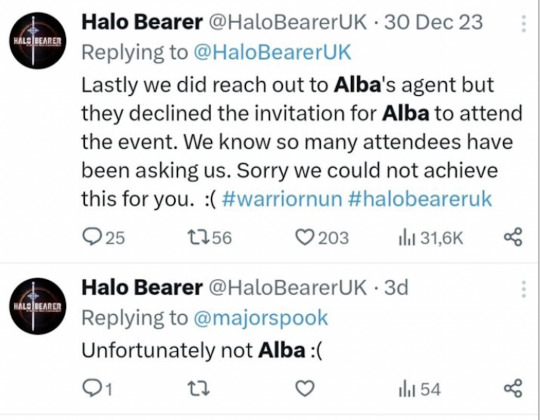
We all know of her extraordinary professionalism. She has promoted the show so much so that we can only imagine how terrified and heartbroken she must have felt to turn down this event. (read sarcasm) And it probably explains why she refused to talk to the media at the GQ event. You see she was not being rude and a diva, she was just being shy and afraid…
Also remember during Chris and Abba’s last papwalk when they allegedly had dinner with Rob Pattinson, Suki, Adrien Brody and Harvey Weinstein’s former wife, they were escorted by Guillermo who is Chris’ bodyguard. Sure it was meant to sell that they are a very famous and popular couple but maybe it served another purpose. Maybe it was meant to sell the narrative that she is terrified of Chris’ fans and needs the protection of a bodyguard. So the question remains: will they be blamed for their divorce?
The ending of this shitshow isn’t likely to happen soon…
Crumbs and hints are in place but that doesn’t mean the end of the shitshow is near. In fact, I would be very surprised if he doesn’t mention his “wife” during his next con at Seattle on March 2nd. Indeed this con is overseen by the same company that did C2E2 and NYCC last year, and let’s remember the NY con was used to confirm the 2 kinda of ceremonies and to show off his ill-fitting ring. We can suspect this company is one of their sponsors, just like the jewelry brand or airline company. But I am just speculating.
It’s safe to assume there will be similar shenanigans in Seattle anyway. Will she actually be there? It’s a real possibility. Especially, since the Oscars’ ceremony is on March 10th. Like for the Golden Globes, it’s a time when celebrities try to be seen. And it will be one of their last occasions to make a splash for a while and have their names in every publication since Chris is supposed to start shooting a new movie in March as well. Unless we get pap pics of them on his movie set. They haven’t done it yet and it would be another box to check off in their PR games.
The manufactured psychotic fans…
For sure there are some crazy fans out there. But I have little doubt as well that most of his crazy fans act this way on purpose because there are plants on the payroll. Even recently, we have seen a ridiculous fake drama around Dodger. An account even published an old picture of Dodger at Daycare. So this mod either hacked into the security cameras of the dog daycare center 6 years ago. Or by some off chance, a crazy stalker fan who worked at that center leaked that pic and sent it to that mod? I should probably specify that this account also got the exclusive (and very believable) story that Renner and Hemsworth told two strangers that they were in Boston for Chris’ wedding. Obviously the most logical explanation is that this blog was fed real info (and that pic) by his team or is working directly for his team. But officially they will pass as crazy fans who crossed the line… And this narrative has proved quite useful in the past.
Playing the victim card is unlikely to get them any sympathy…
I personally think that this strategy won’t benefit either of them.
Particularly Abba. First of all, people are unlikely to believe she needs protection because nobody knows her in the first place. We all remember that ridiculous cringe moment at the Ghosted premiere where a paid actor pretended to be her fan and screamed her name. Also and I don’t mean any disrespect but she is not only unknown to the public but she is also totally unremarkable. She is so unremarkable in fact that when that influencer got the video of them at Walt Disney (the video where you can hear the influencer say at the end: “got it”) she had a pic of Abba’s back tattoo on her screen to make sure she recognized her.
As for Chris, blaming his fans for the end of this shitshow is unlikely to gain him any sympathy either. We have seen so many fan pages disappear, so many fans leave. He has alienated so many loyal fans and a part of the general public with this relationship that isn’t on brand for him. It wouldn’t be wise to alienate the fans that have stuck around.
Also playing the victim card is just not as popular as it once was. First of all, most normal people have troubles feeling sorry for out of touch celebrities. And why should they? They live in the real world and have real problems. Like having to hold on to their low-paying job, to take care of their kids or to put food on the table. Look at Harry and Meghan. Most people can’t stand them anymore. So Chris’ team would be wise to look for another exit strategy. They have time…
63 notes
·
View notes
Note
Hi! I remember you said once you're a fan of Adrien Brody so I thought I could ask you. ☺️ So I am following most of the SPN people and some other actors including Adrien on Instagram and until yesterday nobody I follow was following him. I noticed Misha followed someone new so I checked and it turned out to be Adrien. BUT also Rob follows Adrien now. Isn't that strange (in the best way of course!). Do you know if they know him?
yes, i love adrien! we share a birthday after all. 🤭 you're right, they are both following him now.

back in 1999 misha was in one of adrien's movies called "liberty heights".

they had no scenes together though, i think misha wasn't even credited. maybe they met him this weekend? or they watched one of his movies together? who knows. 😅
10 notes
·
View notes